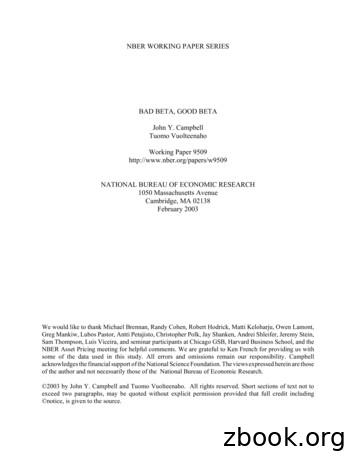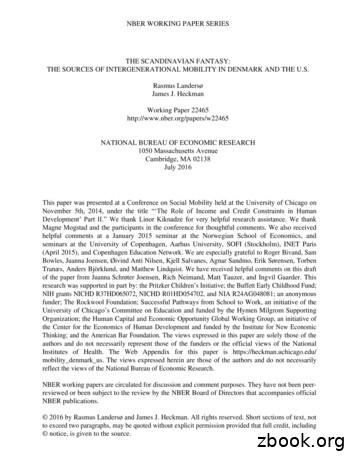Nber Working Paper Series Remedying Education Evidence-PDF Free Download
the authors and do not necessarily reflect the views of the National Bureau of Economic Research. NBER working papers are circulated for discussion and comment purposes. They have not been peer-reviewed or been subject to the review by the NBER Board of Directors that accompanies official NBER publications.
NBER WORKING PAPER SERIES UP FROM SLAVERY? AFRICAN AMERICAN INTERGENERATIONAL ECONOMIC MOBILITY SINCE 1880 William J. Collins Marianne H. Wanamaker . are those of the authors and do not necessarily reflect the views of the National Bureau of Economic Research. NBER working papers are circulated for discussion and comment purposes. They have .
TCCs' successes or failures in preventing, prosecuting and remedying peacekeeper child sexual abuse. More pressure needs to be put on policymakers to ensure that the institutional structures responsible for preventing, prosecuting and remedying peacekeeper child sexual abuse meet these human rights obligations. A key objective for lawyers and
NBER WORKING PAPER SERIES WORKER OVERCONFIDENCE: . paper focusing on overconfidence. The other paper (Hoffman and Burks, 2017) studies the impact . the authors and do not necessarily reflect the views of any of the research funders or the National Bureau of Economic Research.
5 East Asia Seminar in Economics 17 (NBER and others) June 2006, Hawaii. TRIO Conference on International Finance (NBER, CEPR and TCER) December 2005, Tokyo. NBER Summer Institute, International Finance and Macroeconomics July 2005, Cambridge. East Asia Seminar in Economics 16 (NBER and others) June 2005, Manila. A
NATIONAL BUREAU OF ECONOMIC RESEARCH 1050 Massachusetts Avenue Cambridge, MA 02138 December 2005 The authors are respectively from MIT (Department of Economics and Poverty Action Lab), Harvard Business School, MIT( Department of Economics and Poverty Action Lab), and Columbia University
SMB_Dual Port, SMB_Cable assembly, Waterproof Cap RF Connector 1.6/5.6 Series,1.0/2.3 Series, 7/16 Series SMA Series, SMB Series, SMC Series, BT43 Series FME Series, MCX Series, MMCX Series, N Series TNC Series, UHF Series, MINI UHF Series SSMB Series, F Series, SMP Series, Reverse Polarity
3022 Broadway, 623 Uris Hall New York, NY 10027 and NBER apb2@columbia.edu Maya Rossin-Slater Department of Health Policy Stanford University School of Medicine 615 Crothers Way Encina Commons, MC 6019 Stanford, CA 94305-6006 and NBER mrossin@stanford.edu Christopher J. Ruhm Frank Batten Scho
Chicago, IL 60637 and NBER jludwig@uchicago.edu Sendhil Mullainathan Department of Economics Littauer M-18 Harvard University Cambridge, MA 02138 and Consumer Financial Protection Bureau and also NBER mullain@fas.harvard.edu Harold A. Pollack University of Chicago School of Social Service Administration 969 East 60th Street Chicago, IL 60637
In addition, we also searched the NBER working paper series because many in fluential papers may not necessarily progress be yond the working paper stage. Furthermore, given the interest of central banks in bubbles, we also searched the working . stability breed overconfidence, which in turn leads to over-investment and the emergence of asset .
FTG Working Paper Series Designing Stress Scenarios by Cecilia Parlatore Thomas Philippon Working Paper No. 00074-00 . Camara, B., P. Pessarossi, and T. Philippon (2016). Backtesting european stress tests. NBER Working Paper. Cambou, M. and D. Filipovic (2017). Model uncertainty and scenario aggregation.Mathematical Finance 27(2), 534 567. .
Bad Beta, Good Beta John Y. Campbell and Tuomo Vuolteenaho NBER Working Paper No. 9509 February 2003 JEL No. G12, G14, N22 ABSTRACT This paper explains the size and
NBER Working Paper No. 10402 March 2004 JEL No. E44, G12 ABSTRACT This paper analyzes the impact of changes in m onetary policy on equity prices, with the objectives both of measuring the average reaction of the st ock market and als
Uninsured Idiosyncratic Investment Risk and Aggregate Saving George-Marios Angeletos NBER Working Paper No. 11180 March 2005 JEL No. D52, E13, E32, G11, O16, O41 ABSTRACT This paper augments the neoclassical growth model to study the macroeconomic effects of idiosyncratic investment risk.Cited by: 1Publish Year: 2005Author: George-Marios A
The Scandinavian Fantasy: The Sources of Intergenerational Mobility in Denmark and the U.S. Rasmus Landersø and James J. Heckman NBER Working Paper No. 22465 July 2016 JEL No. I24,I28,I32,P51 ABSTRACT This paper examines the sources of differences in social mobility between the U.S. and Denmark.
NBER WORKING PAPER SERIES UNIONS AND INEQUALITY OVER THE TWENTIETH CENTURY: NEW EVIDENCE FROM SURVEY DATA . Elena Marchetti-Bowick, Amitis Oskoui, Paola Gabriela Villa Paro, Ahna Pearson, Shreya Tandon, and Maryam Rostoum. We have benefited from comments by seminar participants at . groups
Faculty Fellowship and from the Harvard Business School Division of Research and Faculty Development. All errors and omissions are our own. The views expressed herein are those of the authors and do not necessarily reflect the views of the National Bureau of Economic Research. NBER working papers are circulated for discussion and comment purposes.
Understanding Strategic Bidding in Restructured Electricity Markets: A Case Study of ERCOT Ali Hortacsu and Steven L. Puller NBER Working Paper No. 11123 February 2005 JEL No. L1, L2, L5, L9 ABSTRACT We examine the bidding behavior of firms competing on ERCOT, the hourly electricity balancing market in Texas.
Start What You Finish! Ex Ante Risk and Schooling Investments in the Presence of Dynamic Complementarities Andrew D. Foster and Esther Gehrke NBER Working Paper No. 24041 November 2017, Revised July 2020 JEL No. I25,O13,O15 ABSTRACT We study the relationship between risk and schooling investment in a low income setting, with a
Education Technology: An Evidence-Based Review Maya Escueta, Vincent Quan, Andre Joshua Nickow, and Philip Oreopoulos NBER Working Paper No. 23744 August 2017 JEL No. I20,I29,J24 ABSTRACT In recent years, there has been widespread excitement around the potential for technology to transform learning.
Investor Attention, Overconfidence and Category Learning Lin Peng and Wei Xiong NBER Working Paper No. 11400 June 2005 JEL No. G0, G1 ABSTRACT Motivated by psychological evidence that attention is a scarce cognitive resource, we model investors' attention allocation in learning and study the effects of this on asset-price dynamics. We
Tax Evasion at the Top of the Income Distribution: Theory and Evidence John Guyton, Patrick Langetieg, Daniel Reck, Max Risch, and Gabriel Zucman NBER Working Paper No. 28542 March 2021 JEL No. D31,H2
Productivity in Pharmaceutical Biotechnology R&D: The Role of Experience and Alliances Patricia M. Danzon, Sean Nicholson, and Nuno Sousa Pereira NBER Working Paper No. 9615 April 2003 JEL No. I11, L24, L65 ABSTRACT Using data on over 900 firms for the p
NBER Working Paper #2724 September 1988 SPECIALIZATION, TRANSACTIONS TECHNOLOGIES, AND MONEY GROWTH ABSTRACT With some models of money and a representative—agent there is no reason for monetary trade because identical individuals can consume their own production. Lucas pr
NBER Working Paper No. 24278 February 2018 JEL No. D12,I30,O12,Z12 ABSTRACT To test the causal impact of religiosity, we conducted a randomized evaluation of an evangelical Protestant Christian values and theology education program that consisted of 15 weekly half-hour sessions.
NBER Working Paper No. 27372 June 2020 JEL No. J15,N12,R23 ABSTRACT We study a program that funded 39,000 Jewish households in New York City to leave enclave neighborhoods circa 1910. Compared to their neighbors with the same occupation and income score at baseline, program participants earned 4 percent more ten years after removal, and these
NBER Working Paper No. 23180 February 2017 JEL No. C01,C54,C55,D8,H0,K0 ABSTRACT We examine how machine learning can be used to improve and understand human decision-making. In particular, we focus on a decision that has important policy consequences. Millions of times each year, judges must decide where defendants will await trial—at home or .
NBER Working Paper No. 29669 January 2022 JEL No. E65,H2,J38 ABSTRACT The Paycheck Protection Program (PPP) provided small businesses with roughly 800 billion dollars in uncollateralized, low-interest loans during the pandemic, almost all of which will be forgiven. With 93 percent of small businesses ultimately receiving one or more loans, the PPP
What Do Employee Referral Programs Do? Measuring the Direct and Overall Effects of a Management Practice Guido Friebel, Matthias Heinz, Mitchell Hoffman, and Nick Zubanov NBER Working Paper No. 25920 June 2019, Revised August 2022 JEL No. D23,M51,M52 ABSTRACT Employee referral programs (ERPs) are randomly introduced in a grocery chain.
CAPE Management of Business Specimen Papers: Unit 1 Paper 01 60 Unit 1 Paper 02 68 Unit 1 Paper 03/2 74 Unit 2 Paper 01 78 Unit 2 Paper 02 86 Unit 2 Paper 03/2 90 CAPE Management of Business Mark Schemes: Unit 1 Paper 01 93 Unit 1 Paper 02 95 Unit 1 Paper 03/2 110 Unit 2 Paper 01 117 Unit 2 Paper 02 119 Unit 2 Paper 03/2 134
Paper output cover is open. [1202] E06 --- Paper output cover is open. Close the paper output cover. - Close the paper output cover. Paper output tray is closed. [1250] E17 --- Paper output tray is closed. Open the paper output tray. - Open the paper output tray. Paper jam. [1300] Paper jam in the front tray. [1303] Paper jam in automatic .
The Economics of Renewable Energy Geoffrey Heal NBER Working Paper No. 15081 June 2009 JEL No. Q3,Q4,Q5 ABSTRACT Greater use of renewable energy is seen as a key component of any move to combat climate change, and is being aggressively promoted as such by the new U.S. administration and by other governments.
Booth School of Business University of Chicago 5807 South Woodlawn Avenue Chicago, IL 60637 and NBER marianne.bertrand@chicagobooth.edu Matilde Bombardini Vancouver School of Economics University of British Columbia 6000 Iona Drive Vancouver, BC V6T 1L4 CANADA and CIFAR and RCEA and also NBER matilde.bombardini@ubc.ca Raymond Fisman Department .
SMP Series page 73 FAKRA Connectors page 77 BNC Series page 79 TNC Series page 108 N Series page 133 7/16 Series page 149 UHF/MINI-UHF Series page 159 F Series page 167 Twin Series page 175 D-sub Series page 179 FME Series page 181 1.0/2.3 Series page 183 1.6/5.6 Series page 189 Filtered Series page 197
Mar 31, 2017 · Tax Evasion and Inequality Annette Alstadsæter, Niels Johannesen, and Gabriel Zucman NBER Working Paper No. 23772 September 2017 JEL No. E21,H26 ABSTRACT This paper attempts to estimate the size and distribution of tax evasion in rich countries. We combine random audits—the key source used to study tax evasion so far—with new micro-dataCited by: 331Publish Year: 2019Author: Annette Alstadsæter,
NBER Working Paper No. 15500 November 2009 JEL No. J24 ABSTRACT In this paper we estimate China’s human capital stock from 1985 to 2007 based on the Jorgenson-Fraumeni lifetime income approach. An individual’s human capital stock is equal to the discounted pr
FinTech Adoption Across Generations: Financial Fitness in the Information Age Bruce Carlin, Arna Olafsson, and Michaela Pagel NBER Working Paper No. 23798 September 2017 JEL No. D14,D83,G02 ABSTRACT This paper analyzes how better access to financial information via new technology changes use of consum
Charles I. Jones NBER Working Paper No. 7375 October 1999 JEL No. O40, E10 ABSTRACT This paper studies a growth model that is able to match several key facts of economic history. For thousands of years, the average standard of living seems to have risen very little, despite increases in the
Towards a General Theory of Deep Downturns Joseph E. Stiglitz NBER Working Paper No. 21444 August 2015 JEL No. 1 ABSTRACT This paper, an extension of the Presidential Address to the International Economic Association, evaluates
Robert J. Gordon NBER Working Paper No. 18315 August 2012 JEL No. D24,E2,E66,J11,J15,O3,O31,O4,Q43 ABSTRACT This paper raises basic questions about the process of economic growth. It questions the assumption, nearly universal since Solow's seminal contributions of the 1950s, that economic growth is a continuous process that will persist forever.







































